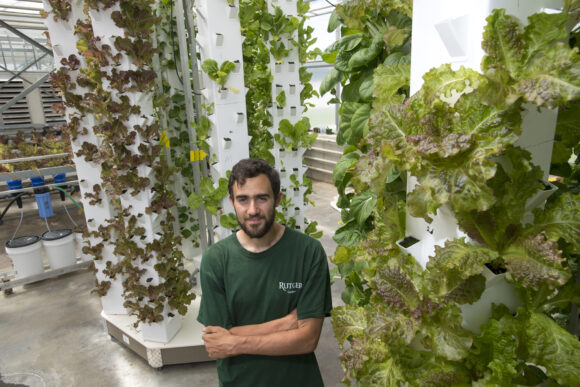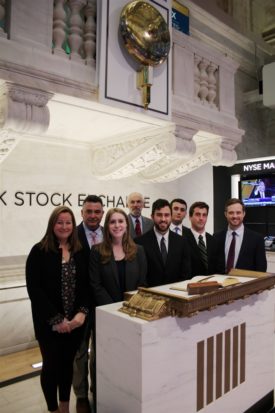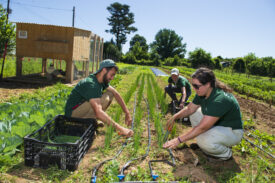
Ameen Lotfi’s coursework included management of hydroponic and aeroponic towers in the Research Greenhouse on Cook campus. Photo: Nick Romanenko
While many students follow a direct path to college, for others the route is more circuitous. For Ameen Lotfi (SEBS 2020), however, it was more of a journey. The son of immigrants–his father is Egyptian and mother is Algerian–Lotfi grew up in Freehold, NJ and recently moved to Lumberton in Burlington County. After receiving his associate’s degree in biology from Rowan College at Burlington County, Lotfi, who plays guitar, decided to pursue his passion of becoming a musician and left for California to study the humanities. When his mother became ill, he cut his studies short and returned to New Jersey to take care of her. At a crossroads, his focus shifted, and his love for science, literature and activism led to an interest in farming.
“When I realized that I wouldn’t be returning to California,” said Lotfi, “I applied to Rutgers as an Agriculture and Food Systems major. That was one of the best decisions of my life.”
Lotfi’s academic career at Rutgers School of Environmental and Biological Sciences (SEBS) is testimony that a non-traditional student (he is graduating at age 26), who is also a transfer, a commuter and employed, needn’t linger on the periphery of college life. Lotfi jumped right in. In addition to academics, he experienced some of the non-classroom opportunities unique to the school.
“The close-knit nature of SEBS allowed me to develop close relationships with my professors, who cared deeply about my progress and worked with me to help overcome the challenges of being a commuting and working student,” said Lotfi.
With support from several scholarships, Lotfi was on his way–his experience at SEBS took him from Wall Street to farm fields. He double-majored in Agriculture and Food Systems and Ecology, Evolution, and Natural Resources, with a minor in Plant Science.

Spring 2019 visit to the NY Stock Exchange: AgScholars on the floor as the NYSE bell chimes to open for business. (L-R) Lauren Taylor (NYSE Event Planner), Professor Stephen Komar, Maryann Zielenski, Ira Polk, Ameen Lofti, Max Blatt, Scott Taylor, and Will Habermann. Photo: Lisa Chiariello.
One of his faculty mentors, professor and director of Rutgers Cooperative Extension Brian Schilling, had a great influence on Lotfi and presented him with the opportunity to join the inaugural class of the Clearing Corporation Charitable Foundation (CCCF) Agribusiness Scholars Program. Through this multidisciplinary and unconventional program, the Ag Scholars networked with people across the agribusiness industry and included diverse visits—from local farms to banks on Wall Street—and an opportunity to meet U.S. Secretary of Agriculture Sonny Perdue.
“We learned ‘soft skills’ and prioritized career-readiness, critical thinking, and risk management,” said Lotfi. “Our class held regular, student-led board room discussions, where we would analyze contemporary issues in the global food and fiber system. We were expected to connect information from multiple levels of inquiry into our discussions.”
In addition to the Agribusiness Scholars Program, Lotfi’s undergraduate experience encompassed research, teaching, advocacy and farming. His outstanding work was recognized by the Department of Plant Biology, Agriculture and Food Systems Program, with the 2020 Agriculture and Food Systems Program Academic Excellence and Community Service Award.
As SEBS Class of 2020 prepares for virtual convocation, the Newsroom caught up with Ameen to reflect on his experience at SEBS.
Q: What other programs/activities you were involved in at SEBS?
A: I completed a George H. Cook Scholars Thesis entitled Initial effects of organic amendments on edaphic properties and biological activity with my research advisor, Dr. John Dighton.
I taught “Exploring Plant & Agricultural Science” as a Peer Instructor for First-Year Interest Group Seminars (FIGS). I was also a class speaker for the FIGS recognition breakfast.
I presented a lecture entitled “Landscape Change Analysis Workshop” at a campus event called Plants in the City: Virtual Herbaria Provide Clues to Our Past and Future.
I’m working to establish the Rutgers Student/Farmworker Alliance, a chapter of the national Student/Farmworker Alliance based in Immokalee, Florida. Our work is affiliated with the internationally-recognized migrant farmworker group, the Coalition of Immokalee Workers.

Ameen Lofti, Landscape Architecture instructor and farm manager Arianna Lindberg, and Student Farm intern graduate student Ellen Senechal work at the Rutgers Student Farm on the Cook campus. Photo: Nick Romanenko.
Q: What are some highlights of your college career?
A: The Student Farm was one of my greatest highlights at Rutgers. There’s a lot to learn in the field that one might miss in a classroom! Under the guidance of the farm manager at the time, Arianna Lindberg, I learned myriad skills related to operating a small organic farm. We produced a variety of crops to serve our diverse clientele at Cook’s Market and the New Brunswick Community Farm Market. We also donated our produce to Elijah’s Promise. This experiential component of my academic career has been invaluable.
My experiences with Dr. Albert Ayeni were some of the most enjoyable and fruitful I had at Rutgers. With him I got to work with ethnic crops – including my favorite, hot peppers – and managed hydroponic and aeroponic towers in the Research Greenhouse.
Teaching my FIGS – where I had my own class of 20 first-year students – was definitely one of my proudest moments. I am deeply grateful that I was one of the Peer Instructor class speakers at the FIGS recognition breakfast.
I’ve also had some incredible experiences as I work to build a food justice organization on campus called the Rutgers Student/Farmworker Alliance. So many students from different organizations, majors, and schools at Rutgers have shown solidarity with our mission, which is to advocate for the dignity of migrant farmworkers in the US. I’ve made wonderful friends along the way.
Q: Who were some professors that had an impact on you?
A: Dr. Xenia Morin, my advisor, has taught me so much through her insatiable appetite for learning and the amount of care she gives her students.
Dr. Brian Schilling, who has been extremely supportive and encouraging, had a huge influence on me. He’s been a close mentor to me since I transferred to Rutgers.
Arianna Lindberg, for her mentorship both on and off the farm.
Dr. Jason Grabosky, for his humor and his devotion to his students.
I couldn’t have asked for a better research advisor than Dr. John Dighton.
Meredith Taylor was one of my first teachers at Rutgers and has completely shaped my outlook in regard to food justice.
Dr. Albert Ayeni for providing me with some of the best experiences I’ve had at Rutgers.
I consider each of these professors to be both mentors and friends.
Q: What unique opportunities/experiences did you get at SEBS that you don’t think you would have had at another university?
A: Managing hydroponic and aeroponic systems to grow ultra-niche crops was definitely a unique experience. Not every school has an organic farm, especially like ours, which was uniquely nestled within the beautiful Rutgers Gardens. SEBS offered all the benefits of a large school while maintaining an intimate experience among students, faculty, and the campus itself (especially with its Living Labs).
Q: What are your career goals and what do you plan on doing after graduation?
A: I plan to pursue graduate work in agroecology and restoration ecology. I’ve been accepted to The Forest School at the Yale School of the Environment, but I’m still deciding if I should defer and take a bridge year to get more hands-on experience beforehand. Ultimately, I hope to be involved with food justice, research, and teaching at the university level. After my experience with the CCCF Agribusiness Scholars Program, I would like to eventually start a business.
Congratulations and good luck to Ameen and SEBS Class of 2020!

